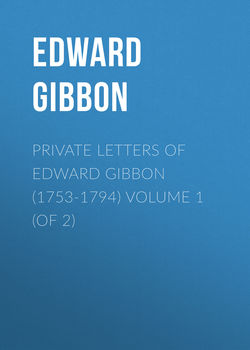Читать книгу Private Letters of Edward Gibbon (1753-1794) Volume 1 (of 2) - Эдвард Гиббон, Edward Gibbon - Страница 33
30.
To his Stepmother
ОглавлениеLausanne, December the 7th, 1763.
Dear Madam,
HIS SIX MONTHS AT LAUSANNE.
I am afraid I have made you wait a little. But let me tell you without any reproach that I have imitated your example in proclaiming the arrival of my letter about two months before it really begins its march. I must acknowledge your letters deserve waiting for better than mine. However I flatter myself you are as well pleased with hearing from me as I can be in hearing from you, and that is saying a great deal.
After having assured you how much I love and respect you, Dear Madam, which I hope you are convinced of without my saying it, I should give an account of my method of passing my time here, but the happiness the most difficult to be described is perhaps the truest in reality. If I was in a place where I could fill pages with accounts of balls, reviews, Court assemblies, &c., the conclusion would perhaps be only that I had spent a great deal of time and money with very little genuine satisfaction. Here every day is an agreable mixture of books and good company, & consequently every day resembles the day that preceded it; I have passed six months at Lausanne, but tho' the sum of my pleasures has been very pleasing I cannot pick out any single event that I think worthy your attention. You would hardly be entertained with minute characters of people you are not acquainted with & will probably never see.
We have some English here; most of them raw boys just escaped from Eaton. Mr. Guise – I do not reckon him in the number of them. He is about my age, has seen a good deal of the world, & without being a profound scholar is far from wanting either parts or knowledge. As far as I can judge of him he seems to be a prudent worthy young man. If I can go into Italy with him I should like it extremely. Lord Palmerston[60] passed thro' some time ago. He seems to have a very right notion of travelling and I fancy will make very great improvements.
GIBBON A MAJOR.
As we have the English papers here, we are by no means strangers to what passes at home, and many an insignificant piece of news which we should not have minded in England, gives us great pleasure at this distance. I was very glad to hear of my friend Wilkes's deserved chastisement,[61] and if the law could not punish him, Mr. Martin could. After all the noise of faction, the numbers in the first division seem to have shewn that the court still preserves a very great superiority.
Will you be so good, dear Madam, as to assure my father of my constant love and duty, and to acquaint him that I have just drawn a bill of a hundred pounds upon him. I beg my best compliments to the brothers. I hope poor David has destroyed his old ennemy the gout. As to Billy [Patton] (do not tell it to him) I hope he is no longer at Beriton, and that he has got the better of a enemy still more dangerous —Laziness.
I am, Dear Madam,
Ever yours most affectionately,
E. Gibbon.
Footnote_60_60
Henry Temple, second Viscount Palmerston (1739-1802), a man of artistic tastes, and, in after-years, a frequent resident in Italy. He was at this time M.P. for Hastings. He married, as his second wife, January 3, 1783, Miss Mee, by whom he was the father of the Prime Minister, born 1784.
Footnote_61_61
In Gibbon's Journal for September 23, 1762, written at Southampton, occurs the following entry which explains the words "my friend Wilkes: " – "Colonel Wilkes of the Buckinghamshire Militia dined with us, and renewed the acquaintance Sir Thomas and myself had begun with him at Reading. I scarce ever met with a better companion; he has inexhaustible spirits, infinite wit and humour, and a great deal of knowledge: but a thorough profligate as well in principle as in practice; his character is infamous, his life stained with every vice, and his conversation full of blasphemy and bawdy. These morals he glories in, for shame is a weakness he has long since surmounted. He told us himself that, in this time of public dissension, he was resolved to make his fortune. Upon this noble principle he has connected himself with Lord Temple and Mr. Pitt, commenced a public adversary to Lord Bute whom he abuses weekly in the North Briton, and other political papers in which he is concerned. This proved a very debauched day; we drank a good deal both after dinner and supper, and when at last Wilkes was retired, Sir Thomas and some others (of whom I was not one) broke into his room and made him drink a bottle of claret in bed." Wilkes had been challenged by Mr. Samuel Martin, M.P. for Camelford, formerly Secretary of the Treasury under both the Duke of Newcastle and Lord Bute, for speaking of him in the North Briton as a low fellow and dirty tool of power. Wilkes was dangerously wounded in the duel, which was fought in November, 1763. In the preceding April he had been arrested under a General Warrant on suspicion of being the author of No. 45 of the North Briton. He applied for a writ of Habeas Corpus, and the case came before Lord Chief Justice Pratt in the Court of Common Pleas. He was discharged from custody, the judges unanimously holding that the arrest was a breach of his privilege as a member of Parliament.
